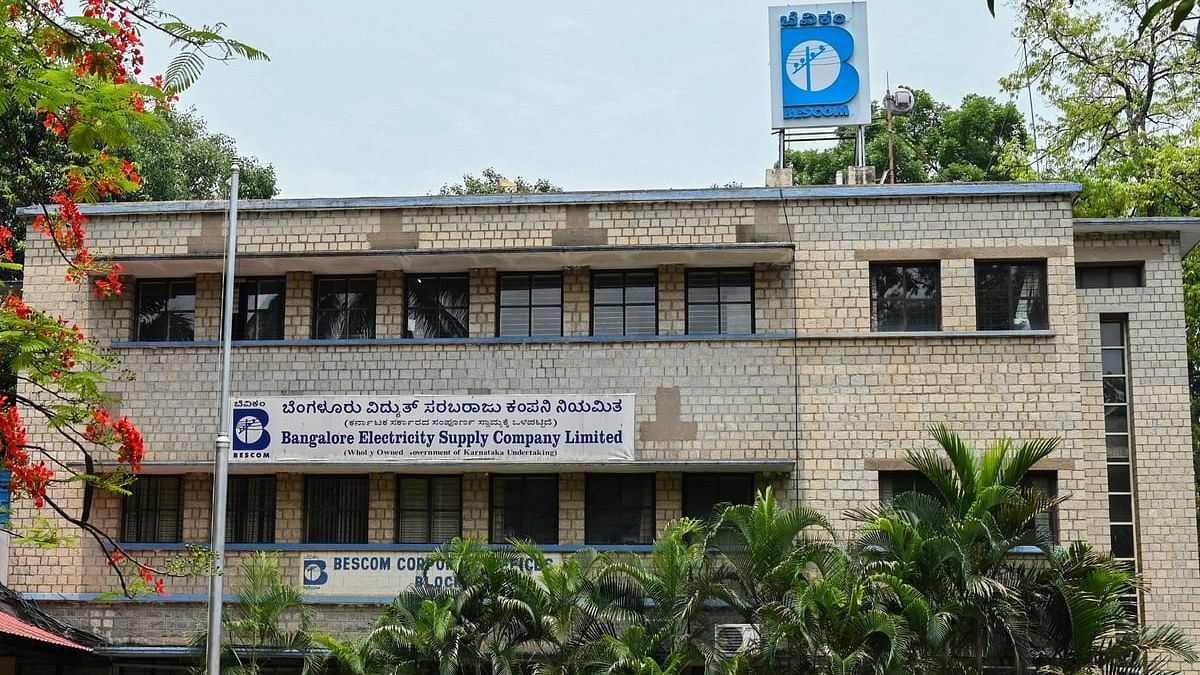
Bangalore Electricity Supply Company Limited (BESCOM) Corporate Office at K R Circle in Bengaluru.
Credit: DH Photo/ S K Dinesh
Bengaluru: State government entities are the biggest electricity payment defaulters, cumulatively owing Bescom Rs 6,842 crore as of March 31, 2024, according to data reviewed by DH.
Despite these staggering dues, accumulated over the last 10-12 years, these defaulters do not face any serious risk of power disconnection, unlike private entities which lose power supply if they default for two months or more.
The bulk of the dues (Rs 5,063 crore) are owed by the Rural Development and Panchayat Raj Department, followed by the Bruhat Bengaluru Mahanagara Palike (Rs 946.46 crore) and the Bangalore Water Supply and Sewerage Board (Rs 537.15 crore).
These unpaid bills have severely affected the finances of the Bangalore Electricity Supply Company (Bescom), the largest of the five state-run power suppliers in Karnataka.
According to a senior Bescom official, the total pending dues from non-governmental establishments and individual households are far less than those of government agencies.
While Bescom disconnects power for private defaulters, it cannot do the same for government establishments. "This is a problem," the official noted.
"Many of these government organisations provide crucial services like water supply and street lighting. Disconnecting the power supply for long durations is not an option because it will cause problems to the public and could prove dangerous. We have cut the power supply to some government offices for an hour or so to make them understand the situation, but that has not helped," the official added.
Another official mentioned that numerous notices served on these organisations have been ignored, further straining Bescom's finances.
"Our financial health is already in a bad shape because we do not get much funding from the government. These dues have piled up over 10-12 years and the inability to recover them fully is a problem,” the official said.
When asked about the response from these agencies, the officer explained, "They often claim that their budgets aren't approved or that the funds allocated for power are based on outdated calculations, resulting in only partial payments."
Acknowledging that many gram panchayats have defaulted on electricity bill payments, RDPR Minister Priyank Kharge said his department was trying to make them self-sufficient.
"It has come to my notice that the payments have been pending for a long time. Making GPs self-sufficient is the only way out. We are trying to improve tax collection and asset management at the panchayat level. The GPs have to become financially strong enough to pay up, we need time,” Kharge told DH.
The BBMP said many payments had to flow in from the government to be passed on to Bescom, and some might have been pending because of the dependence on funds from the state finance commission.
"Some of these payments are disputed since old defunct borewell connections have not been cut. We also have a book adjustment process with Bescom, where road-cutting charges are offset against power bills. We need to verify if this is accurately reflected in the dues," BBMP Chief Commissioner Tushar Girinath said.
The BWSSB claimed the bills were under dispute, and discussions were in progress.
"These arrears have been pending for years. Some bills are from borewells drilled by the BBMP before they were handed over to us. So we have not made the payments," BWSSB Chairman Ramprasath Manohar V said.
Besides, there are pending dues from a few government-sponsored programmes such as providing free or subsidised power for power looms and irrigation pump sets.